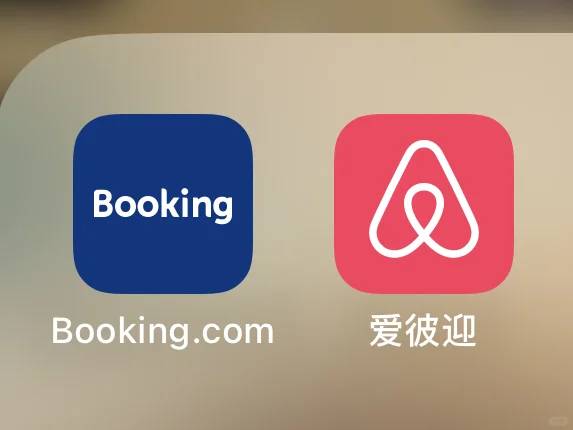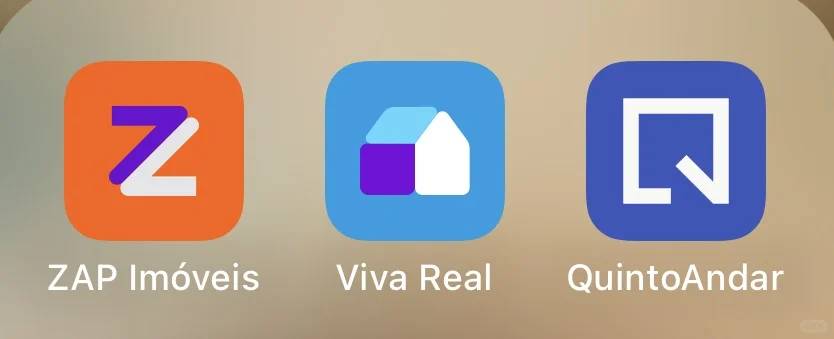Sharing my personal experience of renting in Brazil—but please don’t take it as the ultimate guide! [KissR]🏠

[AirplaneR] **The Transition Period**
When you first arrive, finding temporary accommodation is key. Two apps come in handy during this phase: Booking for hotel reservations and Airbnb (Aibing) for homestay options (see Figure 2). These platforms make settling into your new surroundings a little smoother while you search for long-term housing.

[SelfieR] **Registering on Brazilian Rental Platforms** 📲
To dive into the local rental market, I recommend these three apps: ZAP Imóveis, Viva Real, and QuintoAndar (see Figure 3). Through these platforms, you can explore detailed listings that include photos, location maps, rent prices, Condomínio (property management fees), and IPTU (property taxes). Depending on the property, you may connect directly with landlords or indirectly through agents. Each listing offers its own unique process!

⏰ **Confirming Viewing Times**
When scheduling viewings, expect to share some personal details to facilitate access to gated communities or secure buildings. Ideally, provide your CPF (Brazilian tax ID card). However, if you’ve just landed in Brazil and haven’t secured one yet, your passport will suffice. This step ensures smooth communication and access arrangements.
🏠 **The House Viewing Process**
During the viewing, stay vigilant and thorough. If you spot any issues—like missing furniture or broken appliances—address them immediately. You might negotiate having items repaired or replaced before signing anything. Additionally, feel free to ask the agent or landlord for a tour of the neighborhood and community facilities to get a fuller picture of what life there would be like.
[Money BagR] **Deposits or Seguro Confiança (Credit Insurance)**
Here’s where negotiations begin! Typically, landlords require either a deposit (often equivalent to three months’ rent, plus property management fees and IPTU) or credit insurance. The deposit is refundable upon contract completion, assuming everything goes smoothly.
Credit insurance, however, is non-refundable and calculated as a percentage of the monthly rent, paid monthly. While arranging credit insurance is usually your responsibility, some landlords or agents may assist depending on the situation.
[Thumbs UpR] **Providing Personal Information for Evaluation**
If you fall in love with a place, reach out promptly. The landlord or agent will likely request several documents for evaluation: your CPF, RNE (Brazilian ID), passport, proof of income from recent months, and a completed personal information form.
If you’re new to Brazil and lack a CPF or RNE, mention this upfront so they can work with you accordingly. Based on the submitted materials, they’ll assess your ability to meet rental obligations.
[ChecklistR] **Signing the Lease Agreement**
Once approved, it’s time to finalize the lease agreement! Depending on the circumstances, this can happen either online or in person. First, the agent or landlord will send over an electronic copy of the contract. Take your time reviewing every detail carefully.
If something seems unclear or unacceptable, voice your concerns, negotiate, and suggest modifications as needed. A typical contract covers both parties’ personal information, house details, responsibilities of each side, penalty clauses, termination terms, and signatures—all essential elements to protect everyone involved.
[EightR] Sign the Inspection Report [ChecklistR]🏠
The agent will prepare a detailed report based on the current condition of the house, which both parties must sign to confirm. If you have any concerns or questions, now is the time to bring them up for discussion, adjustment, or further clarification. Ideally, it’s best to sign after taking possession, but in my case, I had to sign beforehand—just something to keep in mind!
[NineR] Take Possession! [Shopping SpreeR]
Once everything is settled, it’s time to unlock your new home! The door might feature a modern electronic lock, in which case the landlord will provide you with a unique password. Alternatively, if it’s a traditional lock, they’ll hand over a physical key. Don’t forget to stop by the community property management office to register—you’ll need this step to ensure smooth access to the community gates and shared amenities.
[Yellow HeartR] I truly hope everyone finds and secures their dream rental effortlessly! [PartyR]